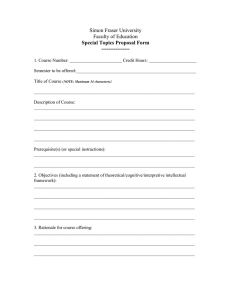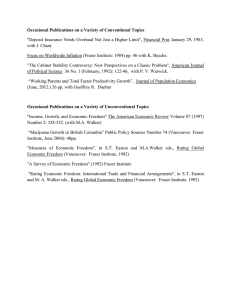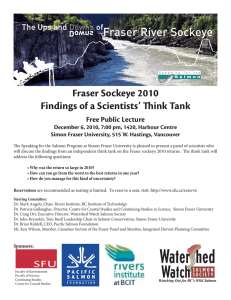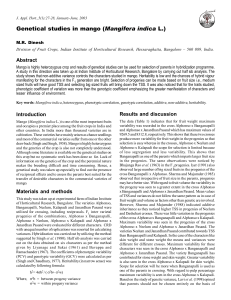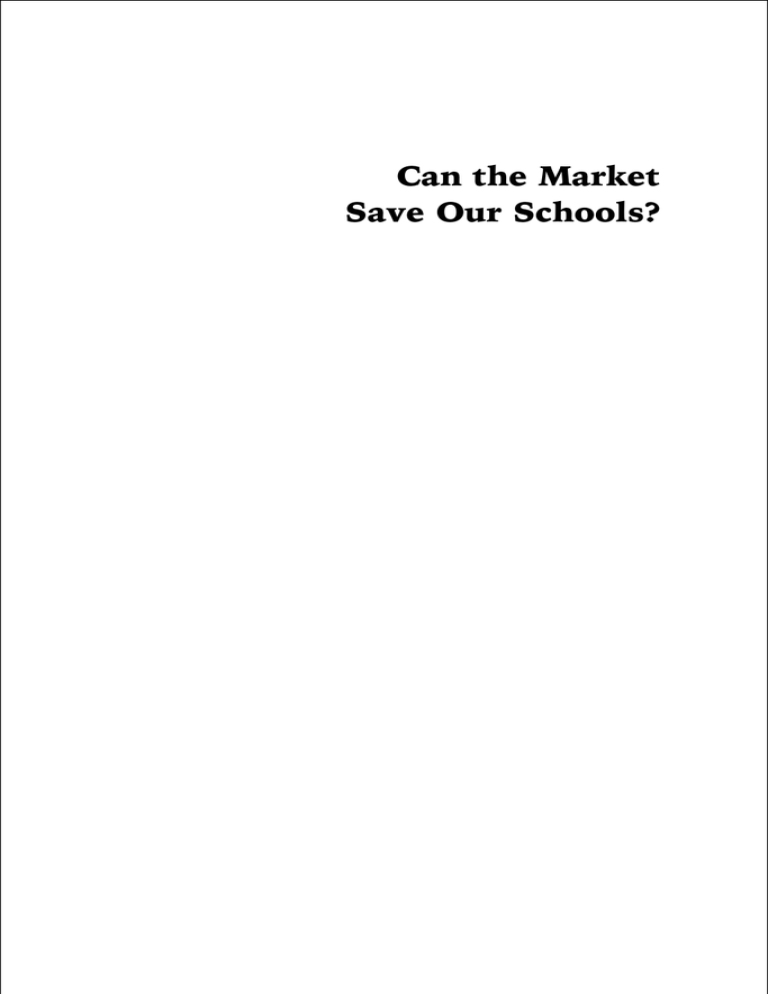
Can the Market
Save Our Schools?
Can the Market
Save Our Schools?
EDITED BY CLAUDIA R. HEPBURN
The Fraser Institute
Vancouver, British Columbia, Canada
2001
Copyright 2001 by The Fraser Institute. All rights reserved. No part of
this book may be reproduced in any manner whatsoever without written permission except in the case of brief passages quoted in critical
articles and reviews.
The authors of this book have worked independently and opinions expressed by them are, therefore, their own, and do not necessarily reflect
the opinions of the members or the trustees of The Fraser Institute.
Printed in Canada.
Canadian Cataloguing in Publication Data
Main entry under title:
Can the market save our schools?
Includes bibliographical references.
ISBN 0-88975-185-4
1. School choice. 2. School choice--Canada. 3. Privatization in
education. 4. Privatization in education--Canada. I. Hepburn,
Claudia Rebanks. II. Fraser Institute (Vancouver, B.C.)
LB2806.36.C36 2001
379.3
C2001-910880-X
Contents
Introduction / 1
Claudia R. Hepburn
Section One: Can the Market Save Our Schools? / 11
Publicly Funded Education in Ontario: Breaking the Deadlock / 13
William Robson
Reinventing Public Education via the Marketplace / 41
Chester E. Finn, Jr.
Market Education and the Public Good / 53
Andrew J. Coulson
Section Two: Case Studies in Market Education / 73
Analyzing School Choice Reforms that Use America’s
Traditional Forms of Parental Choice / 75
Caroline M. Hoxby
The Alberta Charter School Experience / 101
Lynn Bosetti
A Survey of Results from Voucher Experiments:
Where We Are and What We Know / 121
Jay P. Greene
An Evaluation of New Zealand’s Targeted
Individual Entitlement Scheme / 151
Michael Gaffney and Anne B. Smith
Serving the Needs of the Poor:
The Private Education Sector in Developing Countries / 167
James Tooley
v
vi
Can the Market Save Our Schools?
Section Three: Grassroots Perspectives
on Market Mechanisms / 185
A Parent’s Perspective on School Choice / 187
Barbara Lewis
A Student’s Perspective on School Vouchers / 191
Alphonso Harrell
About the Authors
LYNN BOSETTI
The Alberta Charter School Experience
Lynn Bosetti received her Ph.D. in Educational Policy and Administration from the University of Alberta. She is a Professor in Policy and
Administration, who has served as Vice Dean of the Faculty of Education at the University of Calgary. Currently she is the Special Assistant
to the Vice President (Academic), External Academic Relations. She
has recently completed the final report Canadian Charter Schools at the
Crossroads for the Society for the Advancement of Excellence in Education and published recent articles on charter schools in the Alberta Journal of Educational Research and the Peabody Journal of Education. The
recipient of a SSHRC grant to examine parental choice and the search
for community, she is organizing a national conference on the Paradox
and Promises of School Choice in Canadian Schools.
ANDREW J. COULSON
Market Education and the Public Good
Andrew J. Coulson is the author of Market Education: The Unknown History, which compares school systems from around the world, from ancient times to the present, in order to discover which have served the
public well, which have not, and why. A Senior Fellow of the Mackinac
Center and the editor of the web site www.SchoolChoices.org, he has
written for such newspapers as the Wall Street Journal and the Seattle
Times, and for such journals as the Education Policy Analysis Archives and
the Journal of Research in the Teaching of English.
CHESTER E. FINN, JR.
Reinventing Public Education via the Marketplace
Chester E. Finn, Jr. is John M. Olin Fellow at the Manhattan Institute
and President of the Thomas B. Fordham Foundation, of which he is
also a trustee. He is also a Distinguished Visiting Fellow at Stanford’s
Hoover Institution. From 1995 to 1998, he was a senior fellow of the
vii
viii
Can the Market Save Our Schools?
Hudson Institute, where he now serves as an Adjunct Fellow. From
1992 to 1994, he served as founding partner and senior scholar with
the Edison Project. Mr. Finn serves on a number of boards, including
the Centre for Education Reform, Project Achieve, and the Foundation
for Teaching Economics, as well as the advisory boards of the National
Association of Scholars, the Centre of the American Experiment, and
Parents Raising Educational Standards in Schools. From 1988 to1996,
he served as a member of the National Assessment Governing Board,
including two years as its Chairman. He has written and co-authored
many publications on educational issues. He is on leave from the faculty of Vanderbilt University, where he has been Professor of Education
and Public Policy since 1981.
MICHAEL GAFFNEY
An Evaluation of New Zealand’s Targeted Individual Entitlement Scheme
Michael Gaffney has been a researcher at the Children’s Issues Centre,
University of Otago, New Zealand, since 1995. He trained as an elementary school teacher and then worked as a tutor and researcher in
what is now the School of Education at the University of Otago. Mr.
Gaffney has researched a range of topics relating to families and children, including family transitions, children’s television, information
technology, early childhood education, and schooling. He has also worked
for New Zealand’s Education Review Office, which is responsible for
ensuring that all schools and early childhood services meet national
requirements and teach the curriculum. Now a board member of the
school his own children attend, he chairs the management board of an
early childhood centre.
JAY P. GREENE
A Survey of Results from Voucher Experiments:
Where We Are and What We Know
Jay P. Greene is a senior fellow at the Manhattan Institute for Policy
Research. He has conducted evaluations of school choice programs in
Milwaukee, Cleveland, and San Antonio, as well as studied the effects
of school choice on integration and civic values. His work has been
published in such books as Learning from School Choice (The Brookings
Institution, 1998), such journals as The Georgetown Public Policy Review,
Catholic Education, and Education and Urban Society, and such newspapers
as the Wall Street Journal, the Washington Post, and the Cleveland Plain
About the Authors
ix
Dealer. He received his doctorate from the Department of Government
at Harvard University in 1995 and has taught at the University of
Houston and the University of Texas.
ALPHONSO HARRELL
A Student’s Perspective on School Vouchers
Alphonso Harrell is an eleventh grade student at the college prep school,
Cathedral High School, one of the top schools in the state of Indiana.
He maintains a solid ‘B’ average, is a top wrestler, and excels in rugby
and football. Always a very bright child who was eager to learn, Alphonso
began to lose interest in school in the second grade. He and his mother
were told that he was an above average student, who just wasn’t meeting his potential. His mother asked for extra work or any other help,
but none was forthcoming. The following year, she applied for a tuition
grant from The Educational CHOICE Charitable Trust, a privately funded
charity that helps low-income families in Indianapolis afford tuition at
private schools. With the help of CHOICE, Alphonso entered Holy Cross
Central Catholic School, where he soon excelled in academics and sports.
Today, his goal is to attend Notre Dame College.
CLAUDIA R. HEPBURN
Editor
Claudia Hepburn is the Director of Education Policy at the Fraser Institute. Working in the Institute’s Toronto office, she is a frequent media
conmmentator on education issues. She is the author of The Case for
School Choice: Models from the United States, New Zealand, Denmark and
Sweden (Fraser Institute, 1999) and of many articles on education policy,
published in Fraser Forum and newspapers across Canada. Ms. Hepburn
began her career as a teacher working in Hong Kong, Poland and England, and in the Ontario secondary school system. She has a B.A. in
English from Amherst College in Massachusetts, and an M.A. and B.Ed.
from the University of Toronto.
CAROLINE M. HOXBY
Analyzing School Choice Reforms
That Use America’s Traditional Forms of Parental Choice
Caroline M. Hoxby is the Morris Kahn Associate Professor of Economics at Harvard University and a research fellow of the National Bureau
ix
x Can the Market Save Our Schools?
of Economic Research, a non-partisan think tank. She received her Ph.D.
from M.I.T. and has a graduate degree in economics from Oxford, where
she studied as a Rhodes Scholar. Dr. Hoxby’s teaching and research
focus on the economics of education, the labour market, and local governments. Her recent work on K-12 education includes papers on private school vouchers, and private and public school choice. She is
currently conducting an evaluation of how charter schools affect student achievement and the public schools around them. In other recent
work, Caroline Hoxby has studied the growth of teachers’ unionization
and its effects on American schools. She has also examined school finance equalization cases and has advised several states on their school
finance cases. She has analyzed how class size reductions affect student
achievement and has testified for state governments and the federal
government on the effects of class size reduction. Recently, she has
investigated peer effects in elementary and secondary schools.
BARBARA LEWIS
A Parent’s Perspective on School Choice
Barbara Lewis is a single mother whose three children have attended
public and private schools in Indianapolis. When her eldest son was in
the second grade he was very unhappy and his teachers failed to respond to her concerns about his education. Ms. Lewis heard about the
Educational CHOICE Charitable Trust in Indianapolis, a privately funded
charity that helps low-income families in Indianapolis afford tuition at
private schools, and applied for a scholarship for Alphonso. Alphonso
was awarded one and used it to attend a private Catholic school. After
seeing the change in her son’s attitude toward his new environment
and the positive response from teachers and administration at the new
school, she became an active supporter of CHOICE and has helped to
establish a grass-roots parents’ organization called FORCE (Families
Organized for Real Choice in Education).
WILLIAM ROBSON
Education in Ontario: Breaking the Deadlock
William Robson is the Vice-President and Director of Research at the
C.D. Howe Institute. While he specializes in Canadian fiscal and monetary policy, Mr. Robson is also active in education reform. He is a Director of the Organization for Quality Education, the Ontario Coalition
About the Authors
xi
for Education Reform, and the Society for the Advancement of Excellence in Education and also a past Chair of the Ontario Parent Council.
He is a familiar media commentator and author of the book Could Still
Do Better (1999), published by the Ontario Coalition for Education Reform. Mr. Robson has a B.A. from the University of Toronto and an
M.A. from the Norman Paterson School of International Affairs at
Carleton University.
ANNE B. SMITH
An Evaluation of New Zealand’s Targeted Individual Entitlement Scheme
Professor Anne B. Smith is the director of the Children’s Issues Centre
at the University of Otago in Dunedin, New Zealand. She is an applied
developmental psychologist with a particular interest in social development and in ecological and sociocultural influences on children’s
development. Anne’s past research has been in the field of early childhood education and care. More recently she has incorporated children’s
own constructions of their experiences into a broad range of research
studies.
JAMES TOOLEY
Serving the Needs of the Poor:
The Private Education Sector in Developing Countries
James Tooley is Professor of Education Policy at the University of Newcastle. Professor Tooley directed the study of private education investment opportunities in developing countries for the International Finance
Corporation, the private finance arm of the World Bank, which led to
his publication The Global Education Industry (IEA, 1999), now in its second edition. He has consulted for the IFC, World Bank (IBRD), UN,
UNESCO, and Asian Development Bank Institute on private education
in developing countries. In the UK, he has influenced education policy
development and serves on the UK government’s curriculum and assessment committee. He is a regular contributor to radio and television
debates and a frequent keynote speaker at international conferences on
educational issues. Since 1995 he has also directed the Education Program at the Institute of Economic Affairs. Professor Tooley is the author of numerous scholarly and popular articles on the role of
government and the private sector in education, as well as several books
and monographs, including Reclaiming Education (Cassell, 2000), Educa-
xii
Can the Market Save Our Schools?
tion without the State (IEA, 1996), The Higher Education Debate (IEA, 1997),
Educational Research: A critique, (Ofsted, 1998) and The Seven Habits of
Highly Effective Schools (TCT, 1999). Professor Tooley received his Ph.D.
from the Institute of Education, University of London, and has held
educational research positions at the Universities of Oxford and Manchester and the National Foundation for Educational Research. Prior to
entering educational research and policy he was a mathematics teacher
in Zimbabwe.
Acknowledgements
This book is the result of many people’s work. First, I would like to
thank the authors, eight of whom are well-known education scholars
who have contributed years of research to this project. The other two
authors offer insights gained from personal experiences with two systems of education, one a virtual monopoly and the other market-driven.
I learned a tremendous amount from all ten. The authors worked independently, and their views do not necessarily represent those of The
Fraser Institute, its board of directors, or its supporters.
I am also grateful to the book’s reviewers, Jason Clemens and
Stephen Easton, for questions and criticisms that have greatly improved
the book. Thanks also to Laura Jones and Stephen Easton for their advice and encouragement throughout the project. As always, it was a
pleasure to work with them.
The publication of Can the Market Save Our Schools? has been generously assisted by a grant from the W. Garfield Weston Foundation.
xiii

